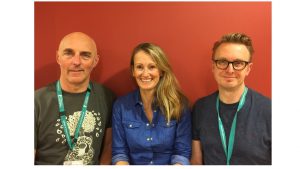
November 11, 2016, by Emma Rayner
Nottingham physios lead global ‘movement for movement’
Physiotherapy researchers from The University of Nottingham are leading a global call for a wider use of exercise and physical activity for the treatment and prevention of many health problems and diseases.
Writing in the British Journal of Sports Medicine, Roger Kerry, Fiona Moffatt and Alan Taylor with Ann Gates of University partner ExerciseWorks! call for a worldwide ‘Movement for Movement’, to try to reverse the increasing scale of physical inactivity in modern society.
Sedentary lifestyles and lack of exercise are leading causes of death worldwide through increasing the risk of non-communicable diseases such as heart disease, type-2 diabetes, and breast and colon cancer. With ‘exercise as medicine’ a well-recognised concept, the World Health Organisation has prioritised global action for tackling physical inactivity, but the team says, despite much international effort, the impact on change is so far poor.
The physiotherapists are joining forces with other leading medics and therapists from around the world to call for a ‘community of practice’ in breaking down barriers between discrete professional groups all with similar aims. Movement for Movement is a strategic plan which will respond to the clear limitations of the current multi-agency infrastructure for physical activity.
Dr Roger Kerry said: ”This is an exciting start to a novel and international initiative which aims to reduce the growing global burden of inactivity-related disease. Our aim is to create a body of common knowledge, practice, resources and approaches so that healthcare and exercise professionals no longer work in silos with limited and often short-lived results.
“We want to build a global community of primary care GPs and nurses, physiotherapists, physical therapists, kinesiologists, exercise physiologists, sports scientists, public health specialists, community outreach and charities. Our Movement for Movement will be a collaborative learning and development platform to share knowledge and act as a catalyst for change.”
The Movement for Movement aims to manifest itself by bringing together global expertise and interested parties in new virtual and physical platforms like conferences, online resources and communications channels, similar to the existing ExerciseWorks! education and training consultancy.
The editorial in the British Journal of Sports Medicine has been one of the most popular among readers this month.
No comments yet, fill out a comment to be the first


Leave a Reply